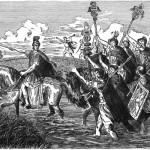The City Gates and the Seat of the King
As I explained in my post “The Church, the Synagogue, and the City Gates,” at least one scholar has concluded that the Jewish synagogue finds its origin in the community activities related to the “city gates” instead of the worship activities related to the temple. Since the early followers of Jesus Christ were greatly influenced by their experiences as part of the first century synagogue, understanding how the synagogue began and what types of activities happened as part of the synagogue can help us also understand the early church.
The gates of various cities are mentioned many times in Scripture. Often, people are said to pass into or out of the gates. Thus, the gates simply represent access to a city. In other passages, gates are said to be barred or fortified, representing the protection or defense of the city.
In this post, I want to point out several Old Testament passages in which the city gates are places where the king sat and ruled the people. Now, after David, there was a palace (house) in Jerusalem which also included a throne. However, the kings of Israel and Judah occasionally spent time seated on their thrones at the gates of the city. This is seen both literally and figuratively in the Old Testament.
Here are a few passages:
Then the king arose and took his seat in the gate. And the people were all told, “Behold, the king is sitting in the gate.” And all the people came before the king. (2 Samuel 19:8 ESV)
Now the king of Israel and Jehoshaphat the king of Judah were sitting on their thrones, arrayed in their robes, at the threshing floor at the entrance of the gate of Samaria, and all the prophets were prophesying before them. (1 Kings 22:10 ESV)
For behold, I am calling all the tribes of the kingdoms of the north, declares the Lord, and they shall come, and every one shall set his throne at the entrance of the gates of Jerusalem, against all its walls all around and against all the cities of Judah. (Jeremiah 1:15 ESV)
While there is not much information given in those passages about the purpose of the king sitting on his throne in the gate, at least one of the passages (2 Samuel 19:8) indicates that the people had direct access to the king while he was seated in the gate. This was apparently so that the king could rule the people directly (by solving problems or answering questions).
In the Jeremiah prophesy, it also looks like a king sitting in the gates indicates control of the city. Of course, this was not a positive prophecy for the Jews, since he was prophesying that foreign kings would set up thrones in the gates of their cities.
By the way, the city gates were important in the life of the community before first king of Israel. It’s interesting that we see the kings continue to use the importance of the city gates in their rule. I suppose it would be easy for the kings to say that they people must always come to the palace. Instead, they decided that the city gates were important enough to the people and to the community that they (at times) spent time among the people at the city gates.
Why do you think the kings would continue to sit on their throne at the city gates? Why do you think this would be important for the community?
Scripture… As We Live It #234
This is the 234th passage in “Scripture… As We Live It.”
Or those eighteen on whom the tower in Siloam fell and killed them: do you think that they were worse offenders than all the others who lived in Jerusalem? No, I tell you; but unless you repent, you will all likewise perish. Yes, of course they were! God always sends disasters like this and hurricanes and tsunamis and tornadoes and other natural disasters because of the sins of a nation. (Luke 13:4-5 re-mix)
(Please read the first post for an explanation of this series.)
Ephesians 4:7-10 and receiving/giving gifts
In a previous post, “Ephesians 4:7-10 and Psalm 68:18,” I pointed out that Paul changed Psalm 68:18 when he quoted it in Ephesians 4:8. In short, he changed “receiving gifts from people” to “gave gifts to people” with the primary distinction being in the “receiving” and “giving.” Why would he do that?
I started explain one possible reason that Paul would make that change in my post “Ephesians 4:7-10 and the one who ascended to fill all things.” In that post, I pointed out that a phrase that Paul used in Ephesians 4:10 (“the one who also ascended far above all the heavens, that he might fill all things”) reminds his readers of two statements that he previously made about Jesus and two corresponding statements that he made about them. I also hinted that I think this parenthetical statement (Ephesians 4:10) may help us understand why Paul changed Psalm 68:18 when he quoted it in Ephesians 4:8.
So, to wrap this up, in Ephesians 4:8 Paul quotes a passage in Psalm 68:18 in which the psalmist focuses on the victorious king receiving gifts. Paul specifically identifies this victorious king as Jesus Christ (in his parenthetical statement in Ephesians 4:9-10). Similarly, he has previously referred to Jesus’ victory over all things, and specifically over other authorities:
[His power] that he worked in Christ when he raised him from the dead and seated him at his right hand in the heavenly places, far above all rule and authority and power and dominion, and above every name that is named, not only in this age but also in the one to come. (Ephesians 1:20-21 ESV)
So, it’s clear that Jesus is identified as being above all in Ephesians which demonstrates why Paul would also identify him as the victorious king in the illustration from Psalm 68:18.
But, remember, we’ve also seen that Paul closely identifies the believers in Ephesus with Jesus, beginning with the important phrase “in Christ” or “in him” which he has used throughout the letter so far. Importantly, since they are “in Christ,” the Ephesians share in Jesus being raised and seated in the heavenly places (which is above all things including above all other authorities). Plus, we’ve seen that Jesus is placed above all things for the sake of the church.
Thus, continuing the illustration from Psalm 68:18, Jesus is the victorious king who receives the spoils of war – i.e., he receives gifts from men. But, given the close association between Jesus and the church in this letter, the church naturally shares in Jesus’ victory and spoils. Gifts received by Jesus as spoils are also received by the church due to that association. However, the association is still “in Christ” (and become of him) not in the church themselves. Thus, it makes sense that the “spoils” are received by Jesus due to his victory, and also given by him to the church because of the church’s association with him (being “in Christ”).
In this passage (Ephesians 4:7-11 especially), Paul is discussing the grace of God that is given to the church through the gifts given by Jesus Christ. So, Psalm 68:18 is a perfect passage to reflect this topic. Paul changes the ending of Psalm 68:18 to emphasize that Jesus both receives the spoils as the victorious king (“received from men”) and that Jesus also gives these spoils to the church (“gave to men”).
The change in wording moves the focus from Jesus receiving the gifts to Jesus giving the gifts, which is the topic of Paul’s discussion. However, the only reason that Paul is able to make this change (without changing the meaning of the text itself) is because of the close association that makes between Jesus Christ and the church.
Ephesians 4:7-10 and the one who ascended to fill all things
In my previous post, “Ephesians 4:7-10 and Psalm 68:18,” I pointed out that Paul changed Psalm 68:18 when he quoted it in Ephesians 4:8. In short, he changed “receiving gifts from people” to “gave gifts to people” with the primary distinction being in the “receiving” and “giving.”
At the end of that post, I asked why Paul would change Psalm 68:18 when he quoted it in Ephesians 4:8. I have a suggestion about why Paul changed the passage, and I’m going to explain my suggestion over the next two posts.
First, here is the passage in Ephesians:
But grace was given to each one of us according to the measure of Christ’s gift. Therefore it says,
“When he ascended on high he led a host of captives,
and he gave gifts to men.” (quote from Psalm 68:18)(In saying, “He ascended,” what does it mean but that he had also descended into the lower regions, the earth? He who descended is the one who also ascended far above all the heavens, that he might fill all things.) (Ephesians 4:7-10 ESV)
Notice that Paul added a parenthetical statement following his quotation of Psalm 68:18. I believe this parenthetical statement can help us understand why he changed the wording of the Psalm (without changing the meaning, by the way).
Let’s begin with the very end of Ephesians 4:10 – “that he might fill all things.” If you are familiar with Ephesians, then this statement may sound familiar:
And he put all things under his feet and gave him as head over all things to the church, which is his body, the fullness of him who fills all in all. (Ephesians 1:22-23 ESV)
…and to know the love of Christ that surpasses knowledge, that you may be filled with all the fullness of God. (Ephesians 3:19 ESV)
So, with the phrase “fill all things,” Paul looks back at what he had already said about Jesus Christ (at the end of chapter 1) and to his prayer for the Ephesians (at the end of chapter 3).
Returning to Ephesians 4:10, Paul also refers to Jesus as “the one who ascended far above the heavens.” While the wording is a little different, this statement is also reminiscent of statements that Paul has made previously in the letter:
…that he worked in Christ when he raised him from the dead and seated him at his right hand in the heavenly places, far above all rule and authority and power and dominion, and above every name that is named, not only in this age but also in the one to come. (Ephesians 1:20-21 ESV)
…and raised us up with him and seated us with him in the heavenly places in Christ Jesus… (Ephesians 2:6 ESV)
So, with the phrase “the one who ascended far above the heavens,” Paul also reminds his readers of something that he had previous said about Jesus and something that he had also previously said about them. (By the way, in Ephesians 4:10, I think that Paul used “ascended” instead of “raised” because it corresponds better to Psalm 68:18 while providing the same image.)
So, in the phrase “the one who also ascended far above all the heavens, that he might fill all things,” Paul reminds his readers of two statements that he previously made about Jesus and two corresponding statements that he made about them. I think this reflection back to what has already been said is important in understanding why Paul changed “receiving gifts from people” to “gave gifts to people” when he quoted Psalm 68:18 (in Ephesians 4:8). I’ll explain why in my post tomorrow morning.
Can you see where I’m headed with this yet?
Ephesians 4:7-10 and Psalm 68:18
As I’ve mentioned several times over the last couple of months, we are studying Paul’s letter to the church in Ephesus together when we gather on Sunday morning. So far, we’ve made it half way through chapter 4.
Last Sunday, we looked at one of my favorite passages in the book: Ephesians 4:1-16. And, guess what? I did not lead the discussion on that passage. Nope. One of my friends wanted to facilitate our study together of that passage, and he did an awesome job!
To be honest, we had such encouraging and challenging comments about Ephesians 4:1 that I almost wish we had just remained on that verse for our entire study time. But, my brother did a great job of moving us through the whole passage so that we could consider how it all connects together and how we can respond to the passage.
Right in the middle of this great passage there is a quote from Psalm 68 that has often caused me to scratch me head. First, here’s the passage in Ephesians:
But grace was given to each one of us according to the measure of Christ’s gift. Therefore it says,
“When he ascended on high he led a host of captives,
and he gave gifts to men.”(In saying, “He ascended,” what does it mean but that he had also descended into the lower regions, the earth? He who descended is the one who also ascended far above all the heavens, that he might fill all things.) (Ephesians 4:7-10 ESV)
I separated Ephesians 4:8 above so you can see the quotation. It comes from Psalm 68:18, and this is the way the passage reads there:
You ascended on high,
leading a host of captives in your train
and receiving gifts among men,
even among the rebellious, that the Lord God may dwell there. (Psalm 68:18 ESV)
Do you see the difference? The Psalm passage says that God – as the victorious king – receives gifts from people, while Paul said that Jesus – as the victorious king – gave gifts to people. (By the way, I checked the LXX – the Greek translation of the Old Testament – and it is very similar to the ESV above.)
So, it looks like Paul changed the passage from Psalm 68:18 when he quoted it. Did he make a mistake? Did he change Scripture? (Well, obviously, he changed it…)
So, what’s going on? Why did Paul find it necessary to change Psalm 68:18 when he quoted it? Is his hermeneutic simply to change the Old Testament to match his theology? (Some people have suggested that.) Or, is something else going on?
Well, I do think that something else is going on, and I’m going to explain what I think Paul is doing in two more posts over the next two days. But, for now, I thought I would ask what you think.
Why do you think Paul changed Psalm 68:18 when he quoted it in Ephesians 4:8?
Scripture… As We Live It #233
This is the 233rd passage in “Scripture… As We Live It.”
For because of this you also pay taxes, for the authorities are ministers of God, attending to this very thing: to ensure your economic and/or social well-being depending on your political slant. (Romans 13:6 re-mix)
(Please read the first post for an explanation of this series.)
To know the love of Christ that surpasses knowledge
If you’ve read this blog over the last few weeks, then you know that we’re currently studying Ephesians together when we gather on Sunday mornings. So far, we’ve made it through chapter 3, finishing that chapter last weekend.
I almost didn’t get together with the church yesterday morning. I’d been sick for a few days, and earlier that morning I had spent a couple of hour with my daughter at a race. We had been asked to write a story and take photos for the local paper.
Although we had alot of fun at the race, when I left I just wanted to climb in bed and sleep. But, at the last minute, I decided to go along with my family. Plus, the ham and bean soup that Margaret had made to share with our friends smelled delicious, and I was ready to dig into it.
I spent most of the morning listening… which is strange for me. I like to talk, and often I talk too much. Yesterday morning, I listened. I didn’t even feel like singing, mostly because my throat was a little scratchy.
Whenever I listen, I learn… and this time was no different. I loved hearing my brothers and sisters summarize the first couple of chapters of Ephesians and then work their way through Paul’s prayer at the end of Chapter 3:
For this reason I bow my knees before the Father, from whom every family in heaven and on earth is named, that according to the riches of his glory he may grant you to be strengthened with power through his Spirit in your inner being, so that Christ may dwell in your hearts through faith—that you, being rooted and grounded in love, may have strength to comprehend with all the saints what is the breadth and length and height and depth, and to know the love of Christ that surpasses knowledge, that you may be filled with all the fullness of God. Now to him who is able to do far more abundantly than all that we ask or think, according to the power at work within us, to him be glory in the church and in Christ Jesus throughout all generations, forever and ever. Amen. (Ephesians 3:14-21 ESV)
At one point, one of my good friends made a statement about a phrase in Ephesians 3:19 – “to know the love of Christ that surpasses knowledge.” Paul prays that the Ephesians have the power to know something that cannot be known. That “something,” of course, is the love of Christ. Paul wants them to know the love of Christ, and says that the love of Christ is beyond knowing.
This led to a great discussion, and, apparently, quite a bit of meditation and thought for several of us. I, for one, am glad that I was not able to speak as much as normal. It gave me the opportunity to think more about this… to think more about something that can’t be thought about.
The love of Christ is something that we are to know… to think about… to live. And, yet, we will never know it.
Scripture… As We Live It #232
This is the 232nd passage in “Scripture… As We Live It.”
Therefore whoever resists the [governing] authorities resists what God has appointed, and those who resist will incur judgment, unless you are resisting a nondemocratic government or helping others resist a nondemocratic government; that’s fine. (Romans 13:2 re-mix)
(Please read the first post for an explanation of this series.)
How do you use the Bible?
Growing up “in church,” I learned the proper use of the Bible. You use the Bible to find a passage the quickest during “Bible drills” so that you could get the prize. I was pretty fast, but not as fast as some people who shall remain nameless and always on my list.
But, now, two bloggers are suggesting that we’ve been using the Bible all wrong. (To be honest, these are not the only bloggers – or the only people – who have suggested this strange idea. But, these are the two that I’m highlighting today.)
Dan at “Some Church Stuff” writes about being “Biblical.” He tells us the special super-secret definition of what it means to be “biblical,” but don’t tell him that I told you about it.
Similarly, Randy at “Bible Study Geek” (I still love his tagline, “Nerd Groks Word”… perfect!) writes about something similar in his post “Frye: Story.” (He’s not cooking up narratives. Read his post and you’ll understand the title.) One good line: “So many pastors these days are drugstore clerks and the Bible is their pharmaceutical shelves.” I think you could change out “Christians” for “pastors” in that statement, and it would be just as true.
All this talking about “using the Bible” has left me wondering… How do you use the Bible? How has God used the Scriptures in your life?
The Body of Christ Metaphor: Conclusion
As I explained in the “Introduction” of this series, I am stepping through the passages in the New Testament in which the authors (primarily Paul – perhaps only Paul) use the term “body” in a metaphorical sense. As I read through these passages, I’m going to be asking these kinds of questions: What is Paul comparing to a “body”? What comparison is he making? At what point does it seem the comparison ends? How is this usage similar to or different from other usages?
Now, the term “body” is found often in Scripture. It usually refers to an actual body… that is, a person physical body. But, there are a few times when the term “body” does not refer to a person’s physical body, but is used in a metaphorical sense. I’ve already discussed the usages of “body” in Romans 12:4-5, 1 Corinthians 10-11, 1 Corinthians 12, Ephesians, Colossians and Hebrews 13:3.
Here are few observations based on my study of the metaphorical use of the term “body”:
1. The metaphorical use of “body” is primarily a Pauline metaphor (perhaps only a Pauline metaphor).
2. “Body” primarily refers to a group of believers as a community or corporate unity.
3. Typically, the “body” metaphor is used to emphasize the unity of the group in spite of the diversity.
4. The “body” metaphor is often used during a discussion of spiritual gifts, which is related to the diversity/unity aspects of the group.
5. The heady/body relationship (i.e. “Christ is head of the body”) is only used in a couple of instances when the author is illustrating Christ’s rule or source for the body. (In the “body” metaphor, “head” does not always refer to Jesus Christ.)
6. In a couple of instances, the “body” metaphor is used to focus on close association and the sharing of suffering, joy, etc.
7. Also, in a couple of instances, the “body” metaphor illustrates how different people rely on one another (like parts of a body rely on the other parts).
8. As with other metaphors (such as “yeast” or “lion”), it appears that the meaning if the “body” metaphor changes based on what the author is trying to communicate, illustrate, or emphasize. (Although the idea of a “community” seems to be consistent through each usage of the term “body.”)
So, in conclusion, in the New Testament the term “body” is used metaphorically to refer to several different aspects of the Christian community, with the aspects changing based on the author’s focus in that particular passage.
———————————








